What Do Phase I Scholars Do?
This year, DO‑IT Phase I Scholars participated in a three-week, online Summer Study session. They learned about college life; explored online resources; interacted with peers, staff, and mentors; and had fun. The DO‑IT Scholars program started in 1993 as an experimental project for teens with disabilities nationwide. While it is usually held on campus at the University of Washington, this year brought new challenges as well as new opportunities. It is currently open to Washington State teens and is supported by the State of Washington.
The DO-IT Summer Program
Have you ever applied to get into a summer camp program? Not too long ago, I applied to the DO-IT Scholars Summer Study program. At first, I was a little skeptical because I’m not used to getting out of my comfort zone to try new things. But my cousin used to work for the program, and she recommended the program to me and convinced me to apply. I was so surprised when I got the email that I got in! I thought that out of all the students who applied, I might not make it. I had to wait a few months to hear back, but it was so great that it was good news.
I began to feel excited to try something new, but scared because I didn’t know all these new people. During the first meeting, everyone was super welcoming. I really admired how the teachers took the time throughout the program to check up on each student and made sure that we were all understanding everything that was going on. I also really liked that if you were struggling or didn’t really feel comfortable sharing your problems, you could send a private chat or text to one of the teachers and they would reach out to you at the end of the day to check in. They also sent out surveys that encouraged you to ask any questions you might have had.
I also really enjoyed the night activities. There were new activities and something for everyone. At these events, both Phase I and II got together and watched movies, played games, and sometimes even just shared in conversations. I genuinely wish more people knew about the DO-IT Scholars program since it has been such a great opportunity.
SnackMagic Snack Packs
SnackMagic is a company that sends snacks boxes to you in the mail that you can customize with amazing items such as snacks, beverages, and other products. Since we were participating in the DO-IT Scholars program from home, we got to look forward to SnackMagic each week!
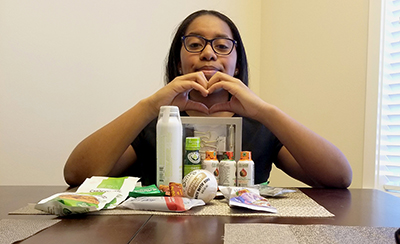
SnackMagic has a variety of snacks and beverages to choose from. If you have specific dietary food restrictions or allergies, SnackMagic gives you the option to choose which kinds of foods or drinks you may want to add to your snack box such as vegan, vegetarian, and others.
When you click on the snack you want, it will show you a description of what ingredients and nutrients are in the snack or beverage. The description will even show what is not in the snack or beverage in case someone is allergic to any of the ingredients. If you enjoyed the snack and want to find more like them, the description will also show a variety of other snacks from the same company.
One of the most useful categories is the “Work and Play” section, where you get to pick items such as journals, pencil holders, etc. You can even add a nice touch to your home by buying a vase with roses or get a few coffee mugs for your morning coffee.
The final thing you can add to your snack box is an item such as a “last minute touch” or a “mystery snack” that gets added without any extra money spent. This was fun because it added something cool or tasty as a bonus! I loved all the cool things I got to pick from DO-IT.
What We Liked During Summer Study
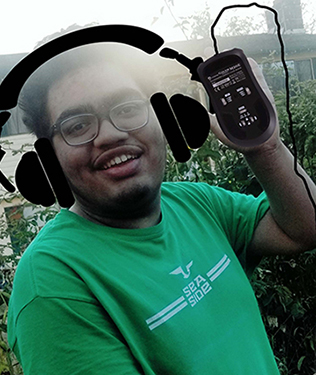
Alex D.
One of the things I enjoyed from the DO‑IT Scholars program was the neuroscience presentation by Dr. Chudler. I thought that the stem cell research was very interesting and I wonder how far it will progress in the future. Another thing I liked was learning about web design, where I was able to code part of a website using HTML.
Warren
One of the things I liked best during Summer Study was getting to work with Lindsey (a 2014 Scholar) who just graduated from the UW with a degree in animation, which is one of my dreams. She helped me figure out how to find good photos and use PowerPoint to create an image collage and merge them to make a cool new design. Together we finished a picture of me with headphones and a mouse, which was cool.
Star Wars Virtual Movie Night
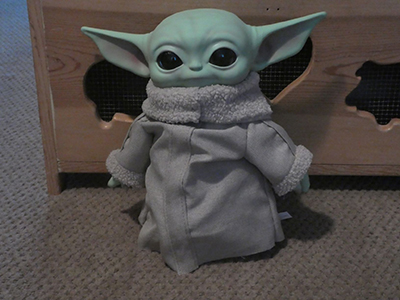
We had multiple virtual movie nights throughout Summer Study. On July 14, we had our first movie. I had an awesome time watching Star Wars: A New Hope on Zoom with my fellow Phase 1 Scholars and DO-IT Staff Tami Tidwell and Kayla Brown. One of my favorite features of having a movie night on Zoom was the chat, because we were able to make comments without ruining the movie by talking over it.
The funniest comments from the Scholars and staff were jokes about the contradictions in the movie. My favorite comment was when a Scholar pointed out the Imperial Stormtroopers’ lack of aim after Ben Kenobi said their aim was precise. This was my favorite because once it was pointed out, another Scholar later commented to point out when the Imperial gunners shot poorly. I loved watching Star Wars with my fellow Scholars and can’t wait to have more conversations in the chat at the next movie night!
Perspectives on Disability
Hi. I’m Jaida, and I have cerebral palsy. Cerebral palsy, or CP for short, happens when the oxygen supply to the brain is cut off during birth. This usually happens when the baby is born too early—that is what happened to me—or sometimes the umbilical cord is wrapped around the baby’s neck. In either case, the result is some damage to a part of the brain. In my case, the nerves that control my legs were the most affected. This type is called spastic because the muscles are tight and hard to control. My arms and fingers are hard to control as well, but not as much as my legs.
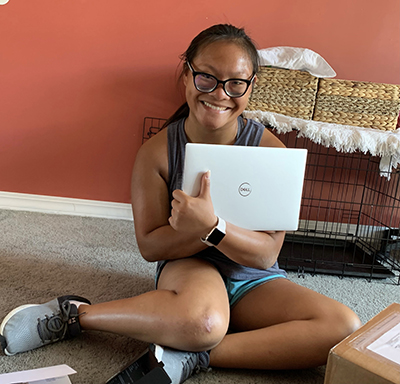
My vision is also affected. Even with glasses, I can’t see the board in class or even across the hall. Sometimes my eyes see things, but don’t get the message to my brain, and I’ve been known to trip on things that are right in front of me in plain view.
CP affects each person differently. Some people with CP can’t eat or swallow, and are fed through a feeding tube. Some use a wheelchair, and some could be sitting right next to you, and you’d never know they have CP because they are barely affected.
Because of my CP, people see me as a disability before seeing me as a person. This can be frustrating, because I am not the girl with cerebral palsy; I am a girl who happens to have cerebral palsy. When people asked me questions, it used to make me feel self-conscious. I would try to push the fact that I have a disability to the back of my mind and not think about it. I didn’t like people asking me questions because it reminded me that I have a disability. Now though, it doesn’t bother me as much, and I know people ask because they are concerned and curious. I know that my disability makes me unique and gives me perspectives that other people don’t have in the world.
Cerebral palsy is not the only disability out there. There are many others, and they each have different effects, which can impact people mentally, physically, or both. People with disabilities can often be looked upon more negatively than others. This is why the words people use to describe those who are disabled are important. Certain words are harmful and disrespectful. Using these types of words in a joking way tends to imply someone did something stupid. This annoys me, since it is implying that people with disabilities are stupid. I know some people think I am stupid because of my disability until they get to know me. They judge me on the way I look or move. I would ask all of you to get to know someone before you judge them, and please choose your words carefully.
Some people also assume that because of my disability, I can’t do certain things, and it’s infuriating because I can do most of the things they assume I can’t do. One time a doctor told me that I wouldn’t be able to learn how to walk. Now, I am on my school’s cross country team, and run at least 2.5 miles every day. Another time, someone told me I shouldn’t run on the playground because I’d fall. I did it anyway. One therapist said that all they wanted was for me to be able to sign my signature legibly enough so that I could sign documents. Now I write anything and everything legibly just fine.
Throughout my lifetime, I’ve had many people tell me that I can’t do something. However, people telling me I can’t do something is also the best thing they could ever do for me, because I am then determined to try and prove them wrong. Although a lot of people have told me I wouldn’t be able to do things, I have had more people try and help me and encourage me, which I am very thankful for.
Sometimes, when people try to help me, I get uncomfortable because I just want to do it on my own, but I do understand that they’re trying to be helpful. I appreciate how everyone, including teachers and students, have continued to support me in everything I do. That is what has gotten me to where I am today.
People always tell me that I take having a disability really well. I do most of the time, but sometimes I don’t, and I sit there and cry. I know I can’t change it, but sometimes I wish I was just a normal 16-year-old girl. However, having a disability has taught me so much. It taught me how to never give up when the thing I want seems impossible to attain, and how to appreciate others and not take things for granted. Remember the saying “don’t judge a book by its cover?” The same thing applies to people with disabilities. Don’t assume that just because someone is disabled, they can’t do something.
There are many ways in which we are different, but there are even more ways we are alike. We can elevate others by appreciating their differences and encouraging each other to support those differences. One final thing to remember and the most important to me is this quote by Carl Gustoff Jung, “I am not what happened to me. I am what I chose to become.”
Juggling Two Summer Camps
This summer, I participated in both the Changemakers in Computing program (CIC) and the DO-IT Summer Study program. These experiences provided me with valuable insights into computing for social good and ways that I can ask for accommodations in college for my hearing loss.
Throughout the CIC and DO-IT Summer Study programs, I was introduced to two different ways society views disability: the medical and social models of disability. The medical model of disability views disability as a defect within the individual that can only be “fixed” by health care professionals.
This model portrays disability negatively and degrades individuals with disabilities. The social model of disability paints disability in a better light, where society’s features inhibit an individual from fully accessing resources and functions due to existing barriers. Most importantly, incorporating accessibility features into society can support people with a diverse range of abilities. This comparison between the two models opened my mind to how society portrays disability in varying ways with different opinions.
During the CIC program, I learned about programming fundamentals and created a hackathon project about internet connectivity, tying together computing with social issues. The DO-IT program allowed me to critically think about how I can advocate for myself with regards to accommodations for college and the variety of assistive technology that are designed by people with varying abilities to support diverse backgrounds.
Culminating my experiences with the DO‑IT and CIC programs, I look forward to continuing to build personal projects that incorporate universal design and accessibility and sharing social issues with others using computing.
Let’s DO-IT
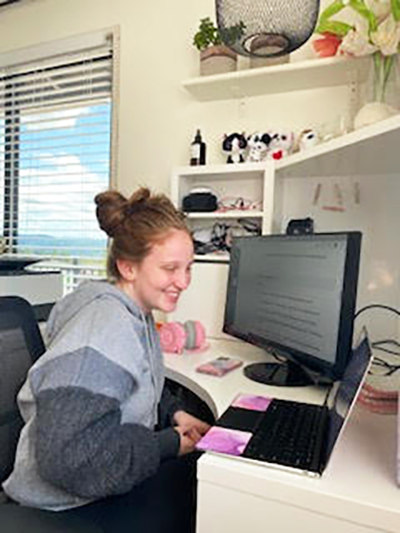
At first, I wasn’t sure what the DO-IT Scholars program was really all about. However, after starting it, I got to learn about so many cool new thing including different disabilities, accommodations to help, and how to advocate for myself.
The DO-IT Scholars program is great because I’ve met so many people who are like me and have a disability. It makes me feel not alone. It’s nice to have people understand what I go through and their support makes me feel happy.
I’ve learned that I have the right to ask for accommodations that I need to help me in school and in life. I have the right to be like everyone else and get the same opportunities to learn and do the things that I like.
Lastly, I’ve learned that it’s important to advocate for yourself because if you don’t speak up, you won’t get your needs met. DO‑IT has taught me so many different ways to help me succeed!
My Dream Home
There were a plethora of fun evening activities over the course of this year’s Summer Study, but by far my favorite was the “Dream Home” Canvas discussion. I loved hearing everyone’s ideas for their dream homes, and it was an amazing way to get to know one another. One key part of our conversation was accessibility in the home, and we all had similar ideas of how to make our homes accessible. Thinking about what you want in your dream home is great, but getting the chance to discuss it with others is even better.
The “Dream Home” canvas discussion happened on Wednesday the 21st, and it was incredibly fun. I thoroughly enjoyed hearing the differences in what came to mind when we all thought of our dream home. While I was mostly focused on how my house would look and how I would decorate it, others thought of the experiences they would like to have in their home. In her main post, Kayla Brown said, “I think it would definitely be a one-level house with a ramp to get through the front door, and a yard for my dog to run around in. I don’t really want anything too fancy, but a room just for crafting would be [amazing]. I love crafting and it would allow me to have some space to learn how to sew!” House features were a prominent part in this discussion, and everyone seemed to have a feature they dreamed of. I mentioned many features I would like in my home, but the ones I wanted the most were “a small library/office with a bay window and a comfy couch to sit and read on. My bedroom would be big, with a small couch to relax on and a four-poster bed.” Talking about our dream homes was a great bonding experience, and I loved hearing everyone’s thoughts.
A key part of our dream home discussion was accessibility. The most mentioned accessibility features were ramps, elevators, and stair lifts. Cleo Chen said in her main post, “[o]ne thing I would put in my dream home would be having either an elevator or slide chair up and down the stairs so that people can easily get upstairs without walking. This would make it so people who have trouble walking up/down stairs can still access the upstairs of my house.” Although most of our discussion was about home features and experiences, accessibility was important to all of us, and it was heavily highlighted in our discussion.
While the main focus of our discussion was how our dream homes felt and functioned, we all talked about the importance of accessibility. Talking about what we wanted in our dream home was an amazing way of getting to know one another, and I look forward to getting to know everyone more in the coming summers.